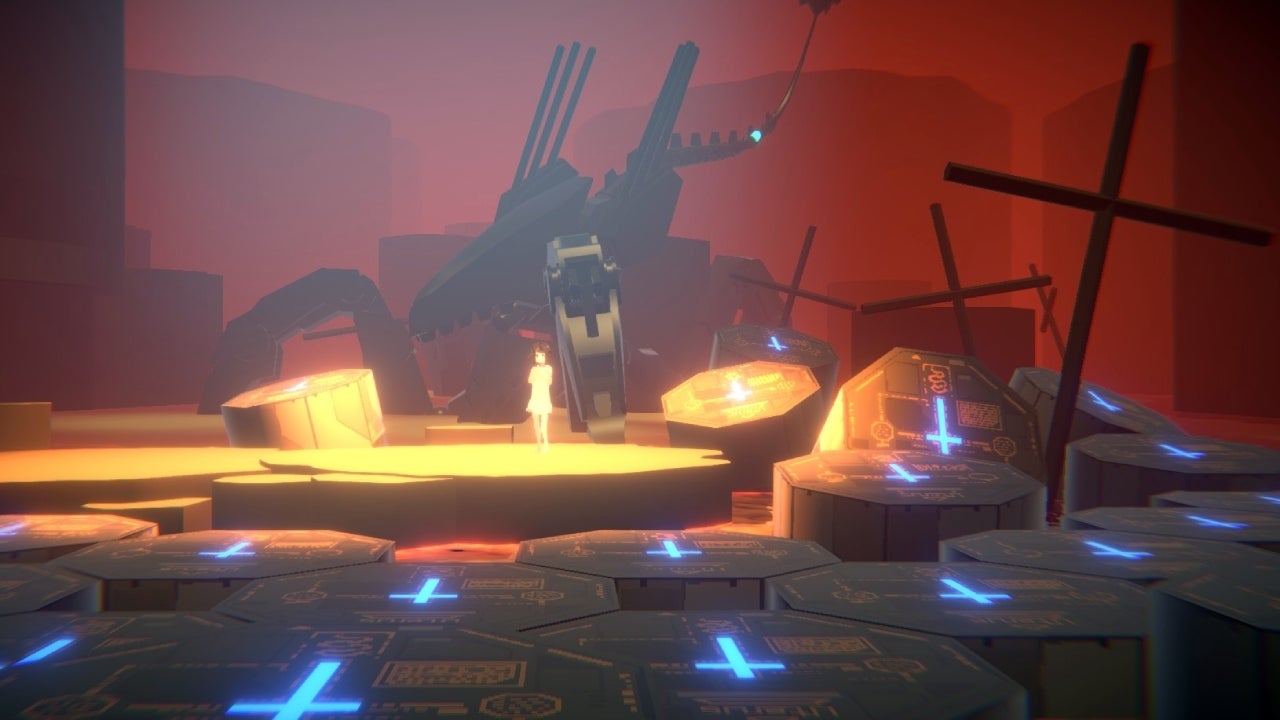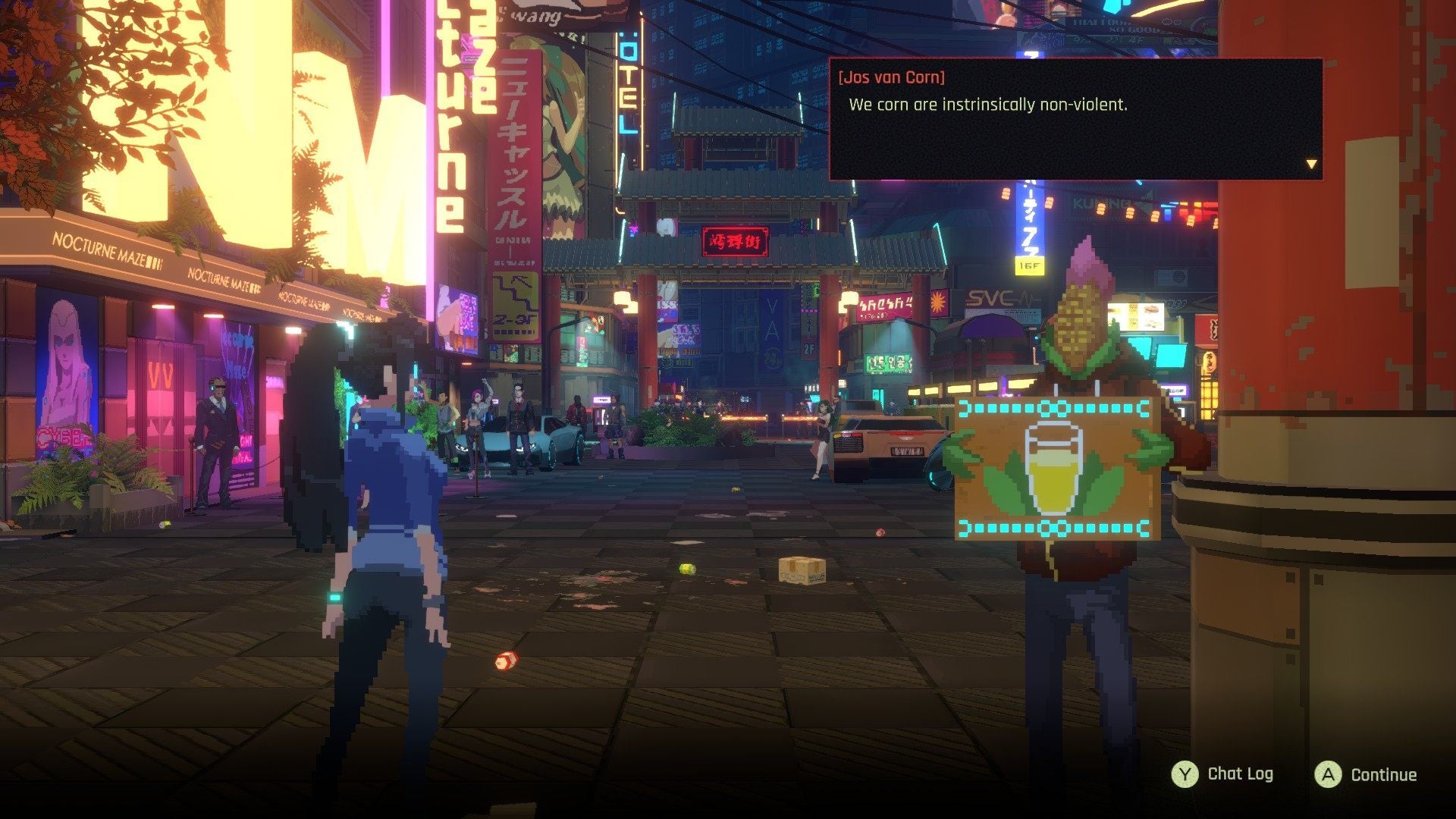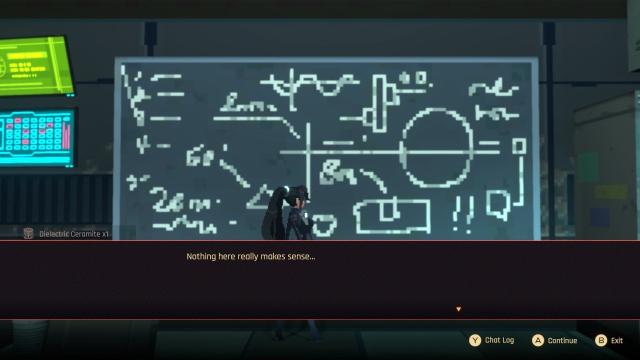Anno: Mutationem is an overly ambitious love letter with one too many recipients. While the game has an interesting gumbo of ideas, its story buckles under the weight of living up to the very properties it attempts to pay tribute to. Ultimately, Mutationem’s ending fails to deliver a satisfying or cohesive pursuit of this monumental undertaking.
The game is a pixel art side-scrolling action game with RPG elements, developed by ThinkingStars. You play as Ann Flores, a “highly skilled combat-trained lone wolf” as she hunts down the cyberpunk gangs and corrupt mega-corporations that kidnapped her brother. Anno: Mutationem, not to be confused with the long-running Anno real-time strategy series, is ThinkingStars’ first video game. While Mutationem does a serviceable job of constructing an intriguing world, its preoccupation with paying homage to the media that inspired it distracts from the story it’s trying to tell.
Mutationem makes overt references to popular sci-fi anime and video games, including Ghost in the Shell, Blade Runner, NieR:Automata, a smidge of Drakengard 3, and Neon Genesis Evangelion. In the game, this feels more spread out over 18 hours, but in its two-hour demo, it felt like rapid-fire callbacks. While on paper, drawing from these iconic properties is a no-brainer for a developer’s first video game, Mutationem boldly goes beyond just mirroring aesthetics and injects their varying “high-concept” ideas on what it means to be human into its plot as well.
I’d liken this phenomenon to using all your favourite seasonings into a dish you’ve never made for the first time. Although those spices pleased your palate in their own dishes, if combined haphazardly, they’ll only clash and overwhelm. The same circumstance comes about when Mutationem transforms its aesthetic references into plot points.
Ghost in the Shell, NieR:Automata, Neon Genesis Evangelion, and the other media Mutationem draws from have heavy, esoteric lore of their own. Mutationem ties itself down by ceaselessly drawing comparisons to these other media. Plot points like GitS’ introspective meditation on the human condition, Blade Runner’s commentary on transhumanism through cybernetics, and NGE’s…everything (most notably End of Evangelion’s third impact) take root within Mutationem’s story as well. While the argument that every piece of media is a remix of elements a creator liked isn’t lost on me, Mutationem becomes a poorly adapted cover to its inspirations rather than rocking to the rhythm of its own story beats.
This is a shame, because buried under all these references is Mutationem’s own unique premise. Interesting story elements–like the game’s poverty-stricken populace suffering from the Mechanika Virus, a disease that slowly turns people into robo-zombies–end up jettisoned to give the game more time to retread ideas from other media. Because Mutationem seems afraid to veer far from its inspirations, which are imperfect themselves, ThinkingStars fails at telling its own story.

Just when you expect the game to pay off your detective work and hard-fought battles against mecha and hordes of cybernetically enhanced militia with some attempt to connect its disparate ideas, it shortchanges you with a lacklustre ending. Similarly to NGE, Mutationem builds up to armageddon, but its final boss comes out of left field. Basically, the government organisation in Mutationem is SEELE from NGE–with all the convoluted reasoning and imagery that implies–and they’re using alternate-dimension tech to do something and must harness Ann’s power to pull it off. While the game’s been hyping you to fight Ann’s alt. dimension self, Amok, you merely fight a dragon. I felt robbed of an epic battle with the rival character I assumed the game was preparing me for, and insulted by the blatant sequel bait.
The gameplay ultimately disappoints, too. Being the unapologetic Devil May Cry devotee I am, games rewarding skill-based combat with gratifying feedback is a must. While Mutationem’s combat hints at being DMC’s pixel-art equivalent, it proves to be a mixed bag of hype visuals and underwhelming grind. The game’s combat systems promise a depth that never plays out in gameplay. While Mutationem allows you to customise, deconstruct, and forge more powerful weapons with elemental mods and unlockable weapon skills, many of these cool bits only materialise near the game’s finale. While you can access some of these abilities earlier through side-quests, the game doesn’t do a good job of letting you know, seemingly railroading you into its convoluted main plot.

After a couple hours, fights don’t really feel rewarding. Simply put, enemies are damage sponges. Once you finally break an enemy’s shield, which works as their second health bar, you have a matter of seconds to wail on them to do some actual damage before their shields recover. The rest is wash and repeat.
One simple answer to this conundrum would be to parry enemies more frequently, resulting in big damage boosts. But the rewards for doing so are negligible, and your foes have confusing hitboxes; if you miss a parry, that’s a chunk of your health gone for the attempt. I had to go out of my way to parry bosses by lining up with their hits instead of letting them come organically. Instead of trusting the game to make my parries count, I developed the instinct to dodge roll constantly because it was the only safe and assured method for maintaining Ann’s health and dealing damage.
While early boss fights are unique, Mutationem’s latter half pulls a Halo 5 by throwing multiple versions of the same boss at you, sometimes fielding two more directly after you prime the first for a finishing blow. Boss fights increasingly felt like wars of attrition, rather than the fast-paced battles of skill the game advertises.
[review heading=”Anno: Mutationem” image=”https://www.kotaku.com.au/wp-content/uploads/sites/3/2022/03/31/bbf5492aedd76919e3b5e1f4a7227145.jpg” label1=”Back Of The Box Quote” description1=””Have neko car, will travel”” label2=”Developer” description2=”ThinkingStars” label3=”Type Of Game ” description3=”Side-Scrolling Action-RPG” label4=”Platforms ” description4=” PlayStation 4, PlayStation 5, PC” label5=”Liked” description5=”Gorgeous pixel art, wacky NPCs, and the endearing dynamic between the game’s main character and sidekick” label6=”Release Date” description6=”March 16, 2021″ label7=”Disliked” description7=”Convoluted story, underdeveloped villains, lore dumping and lacklustre finale” label8=”Played” description8=”18-ish hours, many of which were fighting frustrating boss battles” ]
Outside of combat, Mutationem suffers from the same cognitive dissonance as the Yakuza series, with its side-quests and main missions feeling like two separate games. While Mutationem’s main quest comes off like an AI-generated anime sci-fi plot, its side-quests unabashedly tell wacky and heartfelt stories that characterise the people who inhabit its world. Much of my enjoyment with Mutationem came from straying from its main quest. Avoiding paths or hallways that “looked like progress” led me to discover bizarre NPCs who all had written dialogue and receive snippets of their experiences in Mutationem’s dystopian cyberpunk society.
My favourite interactions came from running into a sewer-dwelling man with a manhole cover for a face, discovering the secret identity of a virtual pop idol, and witnessing the final moments of a robot reaching enlightenment in the sewers. These brief encounters left long-lasting impressions, making its underutilization of these fresher concepts within its larger story all the more frustrating. Instead of reveling in rich storytelling, I was collecting a tally of how many plot elements from other media with which Mutationem garnished its story.
To make matters worse, the game introduces cookie-cutter villains who suffer from the annoying trope of being vague about their intentions. Instead of simply telling you just what the fuck is happening and what they want out of Ann, they simply say they’ll see her again in the worst archetypical anime villain style. These guys even look identical aesthetically, sometimes even mirroring allies. While the game’s latter half attempts to curb this by introducing villains with bizarre new looks, these intricately designed double-crossers’ writing is just as flat as that of their predecessors. Aside from the two leads, the main cast is boring and unimaginative, leaving the incidental environmental NPCs to breathe life into Mutationem’s world.

Storytelling and combat aside, two high points come in the game’s impressive art direction and the winning dynamic between its main characters. The stunning visuals of Mutationem’s setpieces almost supersede the imagery of the media it’s homaging. Ann and Ayane are also really cute. Their banter in between main quest and side-quest content was worth the many brutal deaths and consequent eruptions of “C’mon man!” I yelled when barely photo-finishing enemies.
As ThinkingStars’ first game, Anno: Mutationem boldly swings for the fences by throwing every cool concept it has at players. Mutationem’s unbalanced focus in its story is its critical failure. At one moment, it’s an anime-infused cyberpunk open-world RPG, in the next it’s a rigid story-driven metroidvania. But when it tries to meet in the middle, its pacing screeches to a halt, depriving its latter half of the charm of its wacky, worldbuilding NPCs and replacing it with long stretches of exposition conveyed through dry codexes and vague anime archetypes sporting unclear motivations.
With the game’s ending hinting at a possible sequel, Mutationem stands as a messy first draft. If a follow-up does come, I hope ThinkingStars’ will have the confidence to boldly stand and tell its own unique story rather than remain so shackled to its inspirations.

Leave a Reply